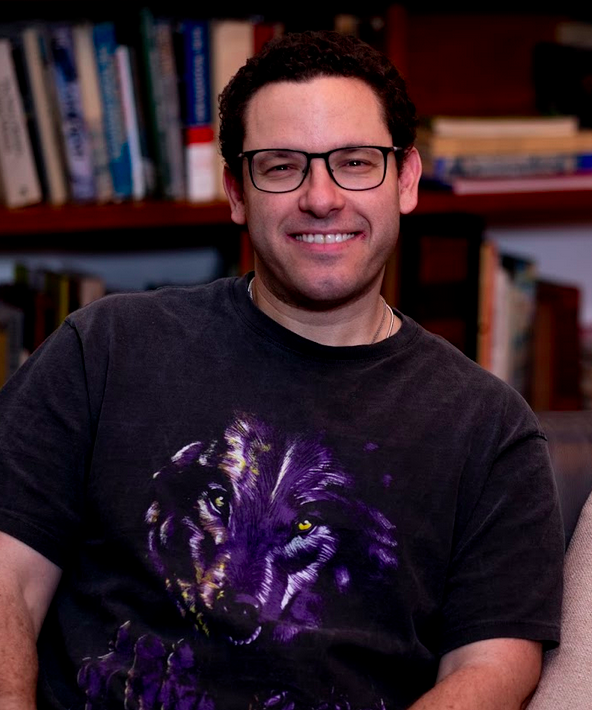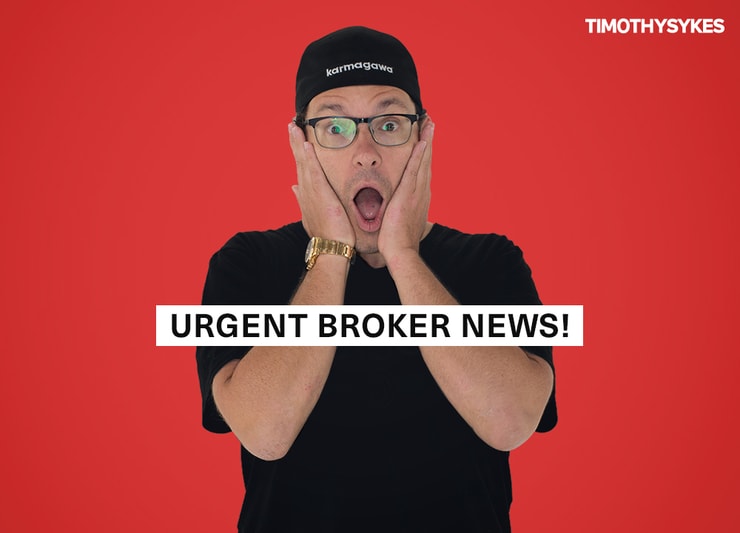Pay attention because I have some urgent broker news…
I’ve said it over and over again: eventually, the regulators will come down on off-shore brokers. And you don’t wanna be there when it happens.
Over the weekend, very quietly, SureTrader began informing clients they were shutting down and transferring client accounts.
Table of Contents
SureTrader Plans to Transfer Client Accounts to F1Trade
When clients logged in to their SureTrader account over the weekend they were met with a pop-up. What did it say?
“…without notice and reason, our clearing broker has recently changed the terms of our relationship. In light of this, there will be changes to your trading account.”
The pop-up went on to offer SureTrader clients two options. The first is to opt out and close your account. The second is to have your account automatically transferred to a new broker called F1Trade.
So beginning today, November 4…
“…all clients will be placed on closing transactions only. If you have open positions, you will have until Friday November 8 to close out these positions in your account or SureTrader reserves the right to liquidate those positions…”
So if you have any open positions with SureTrader … you have until Friday to close them.
Then, you have to decide whether to go with this new broker…
F1Trade: Just Another Off-Shore Broker?
I did a little digging over the weekend. There’s a website up for F1Trade that looks remarkably like a clone of the SureTrader website.
It’s not the exact same site, but most of the text on the website is interchangeable. All you have to do is replace SureTrader with F1Trade. And the F1Trade site uses many of the same images.
Is F1Trade a Rebranding of SureTrader?
There are two big differences…
First, the new broker is registered in St. Vincent and the Grenadines. SureTrader is/was registered in the Bahamas. Being registered in St. Vincent and the Grenadines means F1Trade isn’t required to hold any financial services license or authorization.
Second, F1Trade is a contract for difference (CFD) broker. That means you’re not actually trading stocks. Instead, you and the broker agree to act as if you’re trading the stock. You agree to pay the other party the difference between the buy and sell price.
It’s a lot like the old bucket shops in the U.S., where the great trader Jesse Livermore built his stake before moving to New York.
One more thing you should know … CFD trading isn’t legal in the U.S. It’s legal in the U.K., Canada, Australia, and many other countries. But not in the U.S.
So is this just SureTrader in another guise? It’s hard to say for sure, but it looks plausible. And at the time of writing, the terms of use page on the website shows the company as registered in St. Vincent and the Grenadines but operating in … the Bahamas. (Maybe a ‘cut and paste’ mistake?)
Now let’s look at why this matters to all traders as a matter of urgency…
A Warning to Traders: Stop Trying to Cut Corners With Brokers
I didn’t write this post to rip on SureTrader. I even used SureTrader in the past. But I couldn’t get past the thought that regulators would eventually come down on them.
More Breaking News
- Mustang Bio’s Drastic Turn: Opportunity or Red Flag?
- Hecla Mining Faces Downgrade Amidst Market Uncertainties
- ENDRA’s TAEUS Advancement: A New Era in Liver Imaging?
I Told You So
I hate to say it but … I told you so. I said it in the video featured in this post about the right brokers to use….
“Winter is coming,” I said, “the regulators will eventually come down on off-shore brokers and you don’t wanna be there when it happens.”
You might not be protected the same way as in the U.S. where we have the Securities Investor Protection Corporation (SIPC). (Think the FDIC but for brokerage accounts.)
But the signs were there…
SureTrader’s parent company, MintBroker International Ltd. (formerly Swiss America Securities), has been under investigation by the SEC for several years. And in September, SureTrader was suspended for five days by the Securities Commission of the Bahamas.
MintBroker’s CEO, Guy Gentile, has had past run-ins with the SEC like this pump and dump scheme back in 2007–2008. Now he claims the SEC is engaging in an unfair investigation. And his court battles are ongoing — now tied up in the Third Circuit Court of Appeals.
While this is all interesting stuff … it really doesn’t matter to me because there are better broker options. It only matters because too many students ignore my warnings and get caught in the fallout.
It. Blows. My. Mind. And I keep saying it. STOP TRYING TO CUT CORNERS!

2025 Millionaire Media, LLCEasy and Cheap Doesn’t Mean Good
I get it. When you start trading, you want to make a lot of money. And you think a couple of things are getting in your way … the PDT rule and high commissions.
So when you see an off-shore broker with low commissions and no PDT rule, you think “Oh, this is the answer, now I can trade as much as I want…”
STOP! The PDT rule is there for a reason.
I’ve warned you before, like in this post about using the wrong brokers. Commissions are NOT the issue. The pattern day trader rule is NOT the issue.
The PDT Rule Is Good
The pattern day trader (PDT) rule says that anyone with less than $25,000 in their brokerage account can only take three day trades in a rolling five-day period. To clarify, that’s three trades where you open and close the position the same day. You can take as many overnight positions as you like.
For those of you who think the PDT rule sucks — I used to think the same thing. But after watching so many newbie traders take bad trades, overtrade, and ignore my rules … I changed my mind.
The PDT rule is there to protect you. And if you have the determination to learn the right setups and the patience to wait … the PDT is good.
So, yeah, trading from an off-shore account might seem easy because the PDT doesn’t apply. But that’s the problem. It just gives you more opportunity to overtrade. Which teaches you all the wrong lessons.
Instead, trade less. Focus on taking only the right trades.
When You Focus on the Right Trades, Commissions Are Negligible
I’ve started over with my small account several times. And I’ve grown it to six figures consistently, year after year. Not ONCE did I ever care about the commissions my brokers charged. Why? Because I focus on the right trades.
You don’t have to trade every day. If there’s not a big mover or a supernova, don’t trade. If a trade doesn’t have the potential to make 20%, 30%, or even 50% … don’t trade.
When you focus on the right trades and learn to execute the trades well … you can grow your small account in such a way that those commissions are almost meaningless. And the risk is nothing like the risk you take trying to save $5 by using an off-shore broker.
Get Your Head in the Right Place
If you’re focused on wanting to trade more and save on commissions, your head is NOT in the right place.
It blows my mind how many people want to make a lot of money trading but don’t want to put in the time, invest in the right tools, and refine the process. A lot of people call trading a game. But it’s a serious game. Your future is on the line. And you need to have your head in the right place if you want to win the game.
Off-Shore Brokers Are NOT Worth the Risk
Nickel and diming your education or business expenses will not make you rich. It’s not just the low commissions and no PDT rule. It’s bad trade executions, spotty services, and fees they don’t tell you about. I don’t trust them.
I try to avoid questionable situations. SureTrader is a prime example of why. It’s not worth it. You have to stay in the game to be able to trade.
I don’t trust ANY off-shore brokers. Nor do I trust prop firms, hedge-fund brokers, or startup brokers. And I don’t trust small brokers.
Billion-Dollar Brokers Are Safer
I trade using E-Trade and Interactive Brokers. And before you ask…
… no, I don’t have an affiliate relationship with them.
Actually, they hate me because I tell my students to trade less. They want people to trade more. Yes, I know a lot of brokers have gone ‘commission free.’ At least at some level. But as I said recently in this post, they have ways of making their money. And the more you trade, the better for them.
So why do I insist on using E-Trade and Interactive Brokers? Because they’re big, stable, multi-billion dollar companies. They comply with SEC regulations. I know they’re gonna be there when I wake up tomorrow. And they have all the services I need to trade penny stocks.
I’m not saying they’re perfect — they’re not. But as far as brokers go, they suck the least.
My Millionaire Students Didn’t Nickel and Dime Their Way to Success
None of my millionaire students focused on paying little or no commissions. They focused on learning the patterns and rules in “The Complete Penny Stock Course.”
Sadly, too many people just want hot stock picks. They don’t want to put in the time required to study. You need to invest in your education/knowledge, or you’ll become one of the 90% of losers.
You MUST have the right mindset. What else did my millionaire students do? They invested in education. They focused on the video lessons you can access as a Pennystocking Silver subscriber. And they focused on the DVDs and webinars you can access as a Trading Challenge student.
There’s no shortcut to success. But if you ignore my rules and my warnings there could be a shortcut to a blown-up account. Or a closed-down account. It’s not worth it.
Consider Yourself Warned with this Broker News
If you’ve read this far then I’ve done my job. You’ve been warned — again. Now you have a real-life, very recent example of why you should avoid sketchy off-shore brokers.
I’m here to guide you with my experience and knowledge. In the end, you have a choice … heed my warnings … follow my rules … or learn the hard way.
What do you think of this post? Comment below, I love to hear from all my readers!









Leave a reply